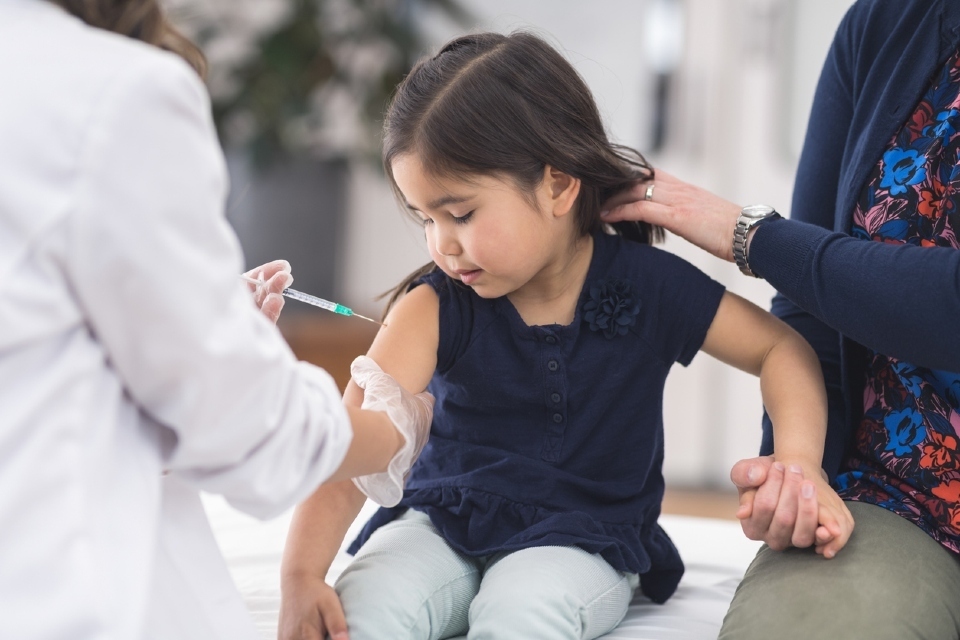
Parents urged to keep childhood vaccination appointments during national COVID-19 restrictions
Published By GOV.UK [English], Tue, Nov 10, 2020 6:25 AM
Public Health England (PHE) is reminding parents that the national COVID-19 restrictions should not stop children from receiving life-saving vaccines. The NHS is ensuring that appointments are still available and that routine vaccinations should continue to go ahead.
Following the introduction of lockdown on 23 March 2020 and during the following 3 to 4 weeks, there was a decline in the number of children receiving MMR and hexavalent (protects against diphtheria, tetanus, pertussis, polio, Haemophilus influenzae type b and hepatitis B) vaccines.
A possible explanation is that COVID-19 messaging about staying at home initially overwhelmed the message that the immunisation programme was operating as usual.
New data from PHE today (10 November 2020) shows a continued recovery since April, but uptake is still behind on previous years – and health experts are concerned these may fall again, leaving thousands of children vulnerable to serious illness.
According to data from 38% of GP practices, 3.8% fewer hexavalent vaccines and 2.8% fewer MMR vaccines have been given compared to the same time last year. PHE continues to monitor this data.
While it is vital to stay at home to parents are urged to ensure children attend routine vaccination appointments and catch up on any vaccinations they have missed – provided parents and children are not displaying symptoms of COVID-19 or self-isolating.
Given the ongoing risk of infectious disease like measles, where high coverage is essential to avoid outbreaks, this will prevent vaccine-preventable diseases and help reduce pressure on the NHS.
Dr Mary Ramsay, Head of Immunisations at PHE, said:
Vaccines remain the best defence against infection. It’s essential we maintain the highest possible uptake to prevent a resurgence of serious and sometimes life-threatening diseases.
Routine vaccinations are still available throughout the pandemic – it’s vital that we continue to make it as easy and safe as possible for parents to take their children to appointments.
Dr Nisha Jayatilleke, National Specialty Adviser – Immunisation at NHS England and NHS Improvement, said:
Vaccines provide essential protection against potentially life-threatening diseases, and the NHS is doing everything it can to enable children to continue to have their vaccinations, while keeping them safe from coronavirus. Provided you, your child or any member of your household are not showing signs of coronavirus, we strongly encourage you to take your children for their vaccination appointments.
Professor Martin Marshall, Chair of the Royal College of GPs, said:
General practice services have been available throughout the pandemic, and GPs and our teams continue to work hard to ensure children can access their childhood vaccines. We can’t stress enough how important it is that parents ensure that children are up-to-date with their vaccination schedules, regardless of lockdown restrictions.
In the UK, we’ve made encouraging advances in our goal to eradicate life-threatening infectious diseases via the NHS’ childhood vaccination programme. As we make progress developing a vaccine to help us tackle Covid-19, we mustn’t neglect the vaccines that we already have. Vaccines only work if people have them and it would be a tragedy if, following the current pandemic, we experienced outbreaks of other deadly diseases for which vaccines already exist because, for whatever reason, people didn’t come forward for their jabs.
As well as the MMR and hexavalent vaccines, parents are encouraged to ensure 2- to 3-year-olds get their flu nasal spray from their GP as winter approaches.
Parents of school-aged children should also continue returning consent forms to their children’s schools, to ensure they receive the flu vaccine.
When going to appointments, people should minimise time spent outside the home and remember ‘Hands. Face. Space’ – ensuring they are 2 metres apart from anyone outside of their household, or 1 metre with extra precautions in place (such as wearing face coverings).
Press release distributed by Media Pigeon on behalf of GOV.UK, on Nov 10, 2020. For more information subscribe and follow